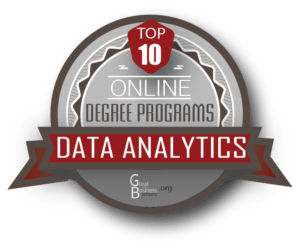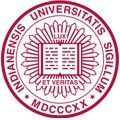 Organizations can improve performance and leverage their competitive advantage by using Business analytics. Virtually, every company seeking to make more effective use of their data resources, relies on business intelligence to detect patterns and relationships in data and predict trends about customers and competitors. Our society is relying more and more on data every day—with that reliance comes the need for data-driven people with the knowledge and skills necessary to harness high volume data, solve crucial business problems, and offer insights to support effective business decisions. Amazingly, according to IBM, 90 percent of the world’s data was created in the last two years. In brief, data analytics/business intelligence is the standard for information processing in today’s technology-centric culture. From commercial to non-profit industries, the use of information technology and the need for statistical analysis continues to expand, and, along with that growth, comes a need for individuals with advanced training. A data scientist/analyst is expected to know everything related to data access, management, manipulation, and analysis. With a deeper understanding and a more effective utilization of data, organizations across the board can then improve performance and secure competitive advantages. It is no wonder that data scientist has been rated the “Best Job in America for 2016” by Glassdoor.com and the title is so in-demand that you may want to enter this high-opportunity field as soon as possible.
Organizations can improve performance and leverage their competitive advantage by using Business analytics. Virtually, every company seeking to make more effective use of their data resources, relies on business intelligence to detect patterns and relationships in data and predict trends about customers and competitors. Our society is relying more and more on data every day—with that reliance comes the need for data-driven people with the knowledge and skills necessary to harness high volume data, solve crucial business problems, and offer insights to support effective business decisions. Amazingly, according to IBM, 90 percent of the world’s data was created in the last two years. In brief, data analytics/business intelligence is the standard for information processing in today’s technology-centric culture. From commercial to non-profit industries, the use of information technology and the need for statistical analysis continues to expand, and, along with that growth, comes a need for individuals with advanced training. A data scientist/analyst is expected to know everything related to data access, management, manipulation, and analysis. With a deeper understanding and a more effective utilization of data, organizations across the board can then improve performance and secure competitive advantages. It is no wonder that data scientist has been rated the “Best Job in America for 2016” by Glassdoor.com and the title is so in-demand that you may want to enter this high-opportunity field as soon as possible.
With a Master’s in Analytics, you will not only acquire the analytical skills to analyze big data, but also the specialized technical skillsets needed for industry-specific applications. The programs selected herein share an industry-defined core curriculum and offer a host of flexible course options such as different concentrations and/or graduates certificates. Most importantly, a degree in data science/analytics promises employers that students understand the important logical framework for solving complex problems unique to the data-to-information pipeline. Finally, career prospects for the industry are phenomenal, with major consulting firm McKinsey Global Institute predicting millions of unfilled positions around the world by 2018. Basically, career opportunities abound in the private and public sectors for people with the ability to gather and analyze large sets of data. For your convenience, we have put together a list of some of the most cost-effective, prestigious, and flexible online masters in data analytics.
Methodology:
- Affordability (1/3): the estimated out-of-state tuition per credit hour (for school’s with out-of-state tuition).
- Flexibility (1/3):the number of flexibility-granting components the program offers including asynchronous and synchronous delivery, accelerated delivery, lenient transfer policies, life experience credits, the ability to test out of subjects and more.
- Academic Prestige (1/3): traditional measure of a program or institution’s excellence including student-faculty ratio, admissions standards, and percentage of faculty with terminal degrees in their field.
1.) Northeastern University

Northeastern University (NU), established in 1898, is a private, global, research university where experiential learning is at the core of its renowned cooperative programs and study is integrated with professional work, research, and service. US. News & World Report ranked NU ranked among the top 50 American universities for the last 4 consecutive years. The school occupies an urban 73-acre campus in Boston, MA–with satellite campuses in many locations. Accredited by the New England Association Of Schools And Colleges (NEASC), NU currently ranks #39 Best National University and #7 Most Innovative School by U.S. News & World Report. Northeastern University registers about 13,697 undergraduate students, promises a student-faculty ratio of 14:1, and 65% of classes cater to less than than 20 students.
Northeastern University’s Master of Professional Studies in Data Analytics equips students with a complete and integrated approach of the mechanics of working with data from collecting to modeling to structuring along with the ability to identify and communicate data-driven insights needed to solve business problems. Graduates will also have the opportunity to develop an important network of analytics professionals. The program has an average completion time of 1 year, full-time, but a part-time option can be completed in 2 years. The 45-credit-hour curriculum requires 8 core and 8 elective courses where the industry-defined core curriculum emphasis is on core analytical skillsets, specialized technical skills, and experiential learning. Conveniently, students will build a portfolio of work samples based on their real-world projects and experiential capstone that will immediately improve career opportunities upon graduation. The program offers prestige thanks to an exceptional faculty of top scholars and innovators from leading industries and fields. Moreover, 92% of graduates are employed full-time or enrolled in graduate school within 9 months of graduation. The program provides affordability due to a very reasonable $646 credit-hour cost. Finally, the program provides flexibility because of a certificate option.
- Cost Per Tuition Hour: $646
2.) Oregon State university

Oregon State University (OSU), established in 1868, is a leading public research institution in the northwest, located in Corvallis, OR and the largest university in the state. The school occupies a 422-acre campus in the heart of Willamette Valley–known for its world class wineries. Accredited by the Northwest Commission on Colleges and Universities (NWCCU), OSU is currently ranked #143 Best National Universities and #95 Best College for Veterans by U.S. News & World Report. Oregon State University matriculates about 24,612 undergraduate students, offers a student-faculty ratio of 18:1, and 27.9% of classes cater to fewer than 20 students.
Oregon State University’s Master of Science degree in Data Analytics is offered entirely online and will teach students the statistical and analytical skills needed to gather, analyze, interpret complex data. Ultimately, this program will equip you with the knowledge and quantitative tools needed to analyze big data without putting your life on hold. The 45-credit-hour program requires 9 core and 4 elective courses that form an interdisciplinary curriculum with a core focus in statistics, computer science, mathematics, and genomics. The program promises prestige since the Oregon State Ecampus is widely considered one of the best providers of online education in the nation. Moreover, the program provides affordability due to a very reasonable $521 credit-hour cost and a Top 50 Best Value Online Colleges – Value Colleges (2017) and TheBestColleges.com (2017). Finally, the program promises flexibility due to a graduate option in health analytics and an option to transfer credits from regionally accredited colleges.
- Homepage
- Cost Per Tuition Hour: $521
3.) Pennsylvania State University

Pennsylvania State University (Penn State), established in 1855, is a public, research-intensive institution. The school occupies an urban, 8,556-acre campus surrounded by mountains in University Park, PA–within the Borough of State College and College Township. Also accredited by the Middle States Commission on Higher Education, Penn State is currently ranked #50 Best National University and #14 Top Public Schools by U.S. News & World Report. Pennsylvania State University registers about 40,742 undergraduate students, promises a student-faculty ratio of 16:1, and 38.9% of classes cater to fewer than 20 students.
Pennsylvania State University’s Master of Professional Studies in Data Analytics is designed for professionals who wish to develop the statistical techniques needed to interpret large amounts of data with descriptive, diagnostic, prescriptive, and predictive analytics. The program has two options: the Base program–which focuses on data collection, storage, and data management–and the Business Analytics option–which specializes in business intelligence training such as the data analytics used in big data to better solve business decisions. This concentration will prepare you to work in positions such as business analyst, analytic system designer, and data scientist. The 30-credit-hour curriculum requires 9 core courses plus a capstone that form a comprehensive curriculum that will focus on design, implementation, maintenance, and application of data management techniques, as well as data mining, modeling, architecture, extraction, and business intelligence. You will use statistics, computer science, machine learning, and software engineering to collect, classify, analyze, and model high volumes of data. The program provides affordability because of a reasonable $930 credit-hour cost. Finally, the program guarantees flexibility due to a graduate certificate option.
- Homepage
- Cost Per Tuition Hour: $930
4.) Indiana University – Bloomington

Indiana University (IU), started in 1820, is a public research institution and the flagship university of Indiana institution. The school sits on a historic and verdant, 1,937-acre campus in Bloomington. Also accredited by the Higher Learning Commission, IU currently ranks #86 Best National Universities and #53 Best Colleges for Veterans by U.S. News and World Reports. Indiana University registers approximately 38,400 undergraduate students, provides a student-faculty ratio of 17:1, and 35.3% of classes cater to less than than 20 students.
Indiana University – Bloomington’s is designed for working professionals because the 100% online program is offered at a fraction of the cost of a residential program. The flexible program allows you to choose between two paths. The Computational & Analytical path focuses on a foundational understanding in four areas: Representation & search of data in databases, Algorithmic development & analysis, Algorithmic & theoretical foundations of machine learning & data mining introductory methods of statistics, and Foundations of distributed computing. On the other hand, the Applied Data Science path is geared towards Statistics, Machine Learning, Data Mining, Text Mining, Data Engineering & Stewardship, and Visualization & Storytelling. The 30-credit-hour program requires 5 core and 9 elective courses where, through a challenging curriculum, graduates will focus their coursework on: network science, statistics, SQL & NoSQL, applied data science, python programming, and a culminating project in the form of independent study. Students can further showcase their skills and gain professional work experience in an industry or research organization setting via an internship. The program offers prestige thanks to world class multidisciplinary faculty and leading researchers. Additionally, the program offers affordability due to a very reasonable $715 credit-hour cost and guarantees flexibility due to a two paths and a certificate option.
- Homepage
- Cost Per Tuition Hour: $715
4.) Dakota State University

Dakota State University (DSU), founded in 1881, is a public, technology-centric institution. The school sits on a rural, 20-acre campus in Madison, SD–a picturesque and bustling community with a small town feel. Also accredited by The North Central Association of Colleges and Schools, DSU currently ranks #108 Regional Universities Midwest and #32 Top Public Schools by U.S. News & World Report. Dakota State University enrolls about 2,820 undergraduate students, offers a student-faculty ratio of 17:1, and 54.1% of classes cater to fewer than 20 students.
Dakota State University’s Master of Science in Analytics (MSA) offers advanced training in analytics and three optional tracks to help focus and personalize your degree. Assuming the traditional 3 courses per term, the program has an estimated completion time of 4 semesters full time, which is roughly 24 months. The 30-credit-hour program requires 6 core and 2 elective courses; additionally, 2 required courses in predictive analytics and advanced data mining applications are needed. Electives are divided into three tracks that students can choose from for a more customized experience, including Information Systems, Healthcare Analytics, and General Analytics. Notably, the program is extremely affordable at a $388 credit-hour cost. Finally, the program is highly flexible thanks to the three elective tracks.
- Cost Per Tuition Hour: $444
6.) University of Alabama Huntsville

The University of Alabama–Huntsville (UAH), founded in 1950, is a public research university, with 16 high-tech research centers and labs. The school sits on a beautiful and historic, 432-acre campus in located in Huntsville, AL–one of the best college towns in the South. Accredited by the Commission on Colleges of the Southern Association of Colleges and Schools, UAH is currently ranked #197 Best National Universities and #106 Top Public Schools by U.S. News & World Report. The University of Alabama–Huntsville registers roughly 6,507 undergraduate and 1,961 graduate students, offers a student-faculty ratio of 16:1, and 44.5% of classes cater to fewer than 20 students.
University of Alabama Huntsville’s Master of Science in Management Science–Business Analytics (MSMS-BA) has an estimated completion time of 1 year and is designed for professionals who are concerned with management science with a specific focus in business analytics. Students will develop decision-making skills within a business environment for the purpose of leveraging competitive advantages, learn to mine and analyze data, design experiments, apply statistical methods, and design solutions to meet the organization’s business objectives. The 30-credit-hour curriculum requires 8 core and 2 elective courses, including 4 management science, 4 business analytics core courses, and 2 electives where participants learn about business analytical theories and methods including big data management, business intelligence, data mining, predictive modeling, machine learning, descriptive analytics, and other quantitative methods. Through a business analytics practicum/capstone participants use analytical techniques to solve real-world problems, and a thesis option is available. The program guarantees prestige thanks to an AACSB International accreditation. Moreover, the program promises affordability thanks to a reasonable $727 credit-hour cost. Finally, the program guarantees flexibility due to a generous 12 transfer-credit policy and 1-year completion time.
- Homepage
- Cost Per Tuition Hour: $727
6.) South Dakota State University

South Dakota State (SDSU), founded in 1881, is a public, land grant, research university that is currently ranked among the Midwest’s top research universities and is also the state’s largest and second oldest university. The establishment can be found on an atypical college campus that not only hosts two museums, but also operates its own dairy farm, an animal farm, and a student-operated pharmacy in Brookings, South Dakota–the fourth largest city in South Dakota. Also accredited by the Higher Learning Commission, SDSU currently ranks #202 Best National University and #110 Top Public School by U.S. News & World Report. South Dakota State University registers roughly 11,007 undergraduate students, provides a student-faculty ratio of 17:1, and 32.4% of classes cater to less than than 20 students.
South Dakota State University’s Master of Science in Data Science (MSDS) is a professionallyelevant and current program designed to equip students with the statistical, mathematical, and computational skills needed to meet the large-scale data challenges of today’s professional world. The program is geared toward the application and interpretation of techniques in data scienceelated capacities and has an expected completion time of 1 year. The 30-credit-hour program requires 10 core courses creating a relevant and innovative curriculum that incorporates current techniques in statistics, operations research, predictive modeling, data warehousing/mining, forecasting, big data programming & management, and data visualization. The program provides prestige thanks to faculty-led research projects such as the Sun Grant Initiative, the Geospatial Sciences Center of Excellence, and the Biochemical Spatio-temporal Network Resource. Finally, the program promises affordability due to a very reasonable $444 credit-hour cost.
- Homepage
- Cost Per Tuition Hour: $444
8.) Iowa State University
![]()
Iowa State University (ISU), established in 1858, is a public, research, land-grant institution; as a flagship it is the largest university in the state. The establishment can be found on an urban campus that has been characterized as one of the 25 most beautiful campuses in the country–several buildings are are listed on the National Register of Historic Places–only 30 minutes from Des Moines in Ames, IA. Accredited by the Higher Learning Commission, ISU currently ranks #111 Best National University and #51 Top Public School by U.S. News & World Report. Iowa State University matriculates about 30,034 undergraduate students, provides a student-faculty ratio of 19:1, and 31.6% of classes cater to fewer than 20 students.
Iowa State University’s Master of Business Analytics is designed for working professionals looking to become managers and apply analytics techniques to businesses, improve organization’s performance, and secure organizational competitive advantages. The program borrows from Computer Science, Electrical & Computer Engineering, Statistics, and Industrial & Manufacturing Systems Engineering. This is a hybrid program that requires minimal campus presence (generally 3 times during the program) and has an approximate completion time of 21 months. The curriculum focuses on data analytics, project management, statistical & predictive modeling, consumer sentiment analysis, knowledge discovery, analytical reporting, segmentation analysis, and data visualization. In terms of customizability, the capstone team project allows for focused training in areas such as fraud detection, risk management, text mining, and process improvement. The program promises prestige thanks to a #16 in the nation ranking by ValueColleges. Additionally, the program provides affordability because of a reasonable $719 credit-hour-cost.
- Homepage
- Cost Per Tuition Hour: $719
8.) Saint Mary’s University of Minnesota

Saint Mary’s University of Minnesota (SMUM), founded in 1912, is a private, Catholic institution sitting on 350 acres in Winona, MN. Although there is a selective admissions process, SMUM is currently ranked #49 “Regional University, Midwest” and #23 “Best Value School” by U.S. News’ Best Colleges Report. 75% percent of full-time undergraduates receive some form of need-based financial aid. The university focuses on graduate work, enrolling approximately 1,100 undergraduates and 4,700 graduate students. SMUM offers an 18:1 student-faculty ratio and 67% of classes cater to less than 20 students.
Saint Mary’s University of Minnesota’s accelerated MBA for working professionals looking to advance their career and create more work opportunities without putting their life on hold. Students who follow the general MBA track and the data analytics option will gain knowledge in data visualization, analytics strategy, and ethics to make informed, data-driven business decisions. Notably, this is an MBA program with an expected completion time of 18 months or less. The 30-credit-hour curriculum requires 6 core and 3 elective courses that emphasize data visualization, case studies in business analytics, and ethics. Additionally, a required capstone course focuses on strategic management skills offers 2 options: domestic or international. As an added amenity every student receives an iPad® loaded with a mobile learning platform so learning stays interactive at all times. The program promises prestige with a faculty full of business experts and active practitioners in the field. Additionally, the program offers affordability thanks to a very reasonable $650 credit-hour cost. Finally, the program offers great flexibility thanks to its accelerated format.
- Homepage
- Cost Per Tuition Hour: $650
10.) Regis University

Regis University (RU) is a co-ed, Jesuit university in New Mexico and was established in 1877. Soon after, it relocated to its present location in Denver, Colorado. Regis University is a community-oriented, military-friendly university recognized for its strong student support services, high-quality education, and prestige in the marketplace. In fact, Regis University’s ranking in the 2017 edition of Best Colleges is Regional Universities West, 23. One of the school’s strong points is its generous transfer-credit policy offering up to 90 credit hours transferable from regionally-accredited universities making it one of the most flexible options on our list. Students can benefit from a small student-to-faculty ratio of 14:1 and personalized attention with 64.2% of classes having less than 20 students.
Regis University’s M.S. in Data Science focuses on analyzing data and gathering insights needed to be highly successful in the rapidly changing and expanding field of data science, and on how critical interpretation and communication shape business strategy and decision-making–all while being socially responsible as taught in the Jesuit tradition. Explore in depth the areas of data engineering and data analytics using data science software with an emphasis on ethics in data. Delivered with a hands-on experience, the 36-credit-hour program requires 6 core and 4 elective courses delivered in 8-week terms. There are 9 electives to choose from and 2 practicum courses that focus on industryelevant applications and on solving real-world problems. Additionally, the program offers affordability due to a reasonable $710 credit-hour cost. Finally, the program guarantees flexibility because of a certificate option.
- Homepage
- Cost Per Tuition Hour: $710
Carrie Morris
Author
Warren Dahl
Editor-in-Chief
